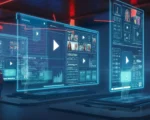The rapid integration of AI across industries is reshaping the digital landscape, but at what cost? For content creators, publishers, and consumers alike, the growing reliance on AI-generated content is introducing challenges that threaten web originality and the very fabric of online information sharing.
From algorithmic bias to a flood of repetitive material, here’s how enterprise-level AI might leave the web in a precarious state.
The Rise of AI Content and the Loss of Originality
AI-generated content is dominating the internet. While tools like AI writing assistants have made content creation faster, the result is often a lack of originality.
Consider this scenario: rather than crafting new insights, many AI tools are simply regurgitating widespread knowledge gathered from pre-existing online sources. Blogs across the web now feature eerily similar “listicles,” reviews, and tutorials. The diversity of voices that once defined the digital ecosystem is being replaced by monotonous, machine-driven replication.
According to a report by Axios, Google’s AI tools are now enabling users to access AI summaries or pre-answered searches without visiting the original source websites. Combine this with the increasing use of AI for rewriting articles and you have a web awash with content that offers little value beyond what already exists.
The Cost of Unoriginality
- Diluted Perspectives
Unique perspectives, cultural insights, and individual voices risk becoming casualties of AI’s repetitive nature. This leaves users with homogenized answers rather than diversity in viewpoints.
- Threat to Small Publishers
Websites relying on traffic from unique, compelling articles face declining revenue since AI-generated content floods search engines, diverting users away from human-crafted material.
Algorithmic Bias and Echo Chambers
AI is only as unbiased as the data it consumes. Unfortunately, AI tools routinely feed on historical datasets riddled with errors and existing societal prejudices. This creates a disturbing cycle of algorithmic bias.
News and Search Implications:
For instance, AI-driven news aggregators push users into echo chambers by showing content aligned with their browsing history, amplifying existing opinions and limiting exposure to diverse perspectives.
Platforms such as Google’s AI search mode, highlighted at their annual I/O developer conference, illustrate the problem. While providing AI-summarized search results, these tools often perpetuate inaccuracies and present one-sided narratives sourced from biased online data.
Why Does Algorithmic Bias Matter?
- It reinforces stereotypes and silences marginalized groups.
- It limits opportunities for objective analysis and critical thinking.
- It creates a loop of misinformation, reducing the credibility of knowledge accessed via search engines.
Over-Reliance on AI Diminishes Credibility
The increasing dependence on AI for content creation creates a troubling issue around quality control. While AI excels at generating content, it still struggles with accuracy, often producing misleading or downright false information, sometimes referred to as AI “hallucinations.”
For example, when Google enabled its AI Mode feature, early users reported instances of unverified information being passed off as facts. Many chat-driven AI tools lack robust fact-checking mechanisms, leaving users to doubt both their reliability and the platforms hosting them.
Poorly curated AI-generated content doesn’t just harm users; it erodes trust in digital ecosystems as a whole.
Ethical Dilemmas and Blurred Lines
AI-generated content raises ethical concerns by blurring the distinction between human and machine. When users can no longer tell if an article, image, or comment was created by a person or a bot, trust in online platforms and communities diminishes.
Creative professionals are among the hardest hit. Writers, designers, and artists report their original work appearing online, slightly tweaked by AI tools, making it difficult to identify outright plagiarism. The concept of intellectual property becomes murky in a web dominated by generative technology.
Impacts on Publishers and the Creator Economy
Publishers and creators are also feeling the financial squeeze. With revenue models dependent on ad impressions and page views, AI advancements such as search summaries and chatbot-driven traffic interception disrupt traditional income streams.
Many tech giants claim they are developing models to channel financial benefits back to creators. For instance, OpenAI has struck deals with publishers to license content for training their AI. However, this is no substitute for the organic traffic and engagement that creators once counted on.
If unchecked, this shift could force many creators behind subscription-based paywalls or out of the digital space entirely.
The Future of the Open Web
The current trajectory suggests a future where meaningful human content exists only in isolated pockets or “dark forests,” as some calling them. These private, invitation-only spaces could replace today’s open web for those pursuing creativity free from the intrusions of corporate AI.
For others, there is hope in building more ethical AI systems that prioritize transparent collaboration with creators, fair data use policies, and equitable revenue sharing models that help sustain the creator economy.
What Needs to Happen Next?
For AI and the web to coexist without dismantling each other, action is needed on multiple fronts:
- AI Transparency
Tech companies must be clear about how their models generate and curate content, ensuring it aligns with ethical standards.
- Support for Original Content
Redirect financial incentives to publishers and creators who actively contribute to the online knowledge pool.
- Fact-Checking Regulation
Establish stronger controls to minimize AI-powered misinformation.
Without these safeguards, the “web of information” may erode into a shell of its former self, leaving users with an unreliable and shallow resource.
Striking a Balance Between AI and the Web
AI tools offer incredible opportunities to enhance productivity and expand access to information. However, as this technology becomes deeply integrated into our digital routines, maintaining balance is critical. Ensuring AI serves to complement, not overshadow, human creativity and perspective will determine the future of the open web.
Want to learn more about the ethical implications of AI on the web? Stay informed by subscribing to our newsletter for expert insights.








